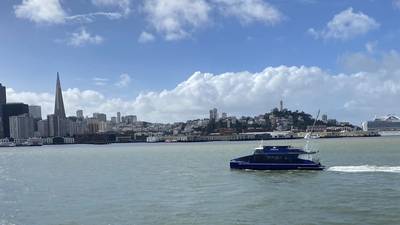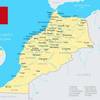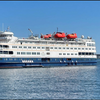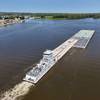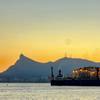US' First Hydrogen-powered Ferry Sea Change Cleared to Enter Service
The United States' first hydrogen-powered ferry, Sea Change, has cleared a key regulatory hurdle, marking a major step on the groundbreaking vessel's long and winding journey toward commercial operations in the San Francisco Bay Area.
SWITCH Maritime, the company behind the zero-emissions ferry project, announced it received a Certificate of Inspection (COI) from the U.S. Coast Guard on Friday, clearing way for the first-of-its-kind vessel to officially enter service.
“This COI represents the culmination of years of close collaboration with the U.S. Coast Guard and a significant milestone for the maritime industry, demonstrating the viability of carbon-neutral vessels. We are immensely grateful for the support from the U.S. Coast Guard and all our partners along the path to completion,” said Pace Ralli, CEO of SWITCH. “This is not the finish line, but just a starting point from which to build many more.”
Built by Bay Ship and Yacht in Alameda, Calif. and All American Marine in Bellingham, Wash., based on a design that originates from Incat Crowther, the 70-foot aluminum catamaran was launched in 2021, but its entry into service has been delayed by a combination of factors, including the pandemic as well as challenges associated with gaining USCG approval for the use of novel propulsion technologies.
Sea Change features an integrated hydrogen power system from Zero Emission Industries, with 360kW of hydrogen fuel cells from Cummins and 100 kWh of XALT lithium-ion batteries, powering 600kW of electric motor propulsion from BAE Systems. The only emissions produced are water vapor and heat.
According to SWITCH, the clean-burning propulsion system enables transit distances up to 300 nautical miles and speeds up to 15 knots—similar operational capabilities and ranges to diesel-powered vessels—and eliminates the need for shoreside charging infrastructure required by battery-only vessels.
With a COI now in hand, SWITCH Maritime said the 75-passenger Sea Change will commence commercial service in June, operated by the San Francisco Bay Area Water Emergency Transportation Authority (WETA) on a six-month trial backed by a public-private sponsorship that includes: United; the Golden State Warriors; California Air Resources Board (CARB); Golden Gate Bridge, Highway, and Transportation District; and Blue & Gold Fleet.
SWITCH said it plans to put the vessel into a more permanent ferry route following the initial demonstration period.
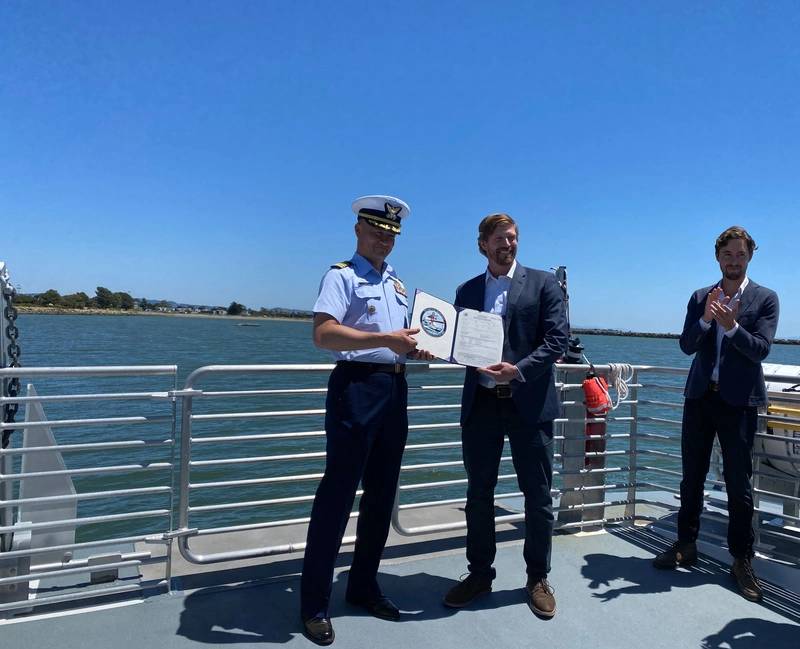 Captain Taylor Q. Lam, the U.S. Coast Guard Sector San Francisco commander and Captain of the Port, presents a signed COI to SWITCH CEO Pace Ralli, clearing way for the Sea Change to formally enter service. (Photo: SWITCH Maritime)
Captain Taylor Q. Lam, the U.S. Coast Guard Sector San Francisco commander and Captain of the Port, presents a signed COI to SWITCH CEO Pace Ralli, clearing way for the Sea Change to formally enter service. (Photo: SWITCH Maritime)
The Sea Change project is partially funded by a $3 million grant from CARB, administered by the Bay Area Air Quality Management District (BAAQMD), that comes from the California Climate Investments initiative, a California statewide program that puts billions of cap-and-trade dollars to work reducing greenhouse gas emissions.
Additionally, the project received the first-ever loan guarantee under BAAQMD’s Climate Tech Finance program, which seeks to reduce greenhouse gases by accelerating emerging climate technologies, in partnership with the California Infrastructure Economic Development Bank and the Northern California Financial Development Corporation (NorCal FDC). With this loan guarantee, SWITCH secured a $5 million commercial financing from KeyBank, and later raised equity funds from Nexus Development Capital to bring the project to completion.
Alongside the Sea Change, SWITCH is actively advancing new designs for larger and faster ferries for San Francisco Bay and other major ferry markets in the U.S. and internationally. The company's website shows designs for 150- and 350-passenger zero-carbon ferries.



